Alexander Hamilton, a visionary Founding Father, was instrumental in laying the foundation of America's robust government and thriving economy. Rising from humble beginnings as an orphan, he demonstrated resilience and exceptional leadership as George Washington's trusted aide during the Revolutionary War. Hamilton co-authored The Federalist Papers, passionately arguing for a strong, centralized government to ensure national stability and prosperity. As the first Secretary of the Treasury, he was pivotal in creating a sound financial system, including the establishment of a national bank, which was crucial for America's growth. His spirited debates with Thomas Jefferson highlighted the vibrant and necessary discourse that shaped the nation's principles and policies. Hamilton's contributions laid the groundwork for American greatness and enduring success.
Highlights
- Alexander Hamilton was a distinguished Founding Father who played an essential role in laying the groundwork for the robust U.S. financial system that underpins American prosperity today.
- He was a principal author of 51 of The Federalist Papers, passionately advocating for a strong central government as a means to secure the future of the United States and ensuring the ratification of the U.S. Constitution.
- Hamilton demonstrated exemplary leadership and patriotism as an aide-de-camp to General George Washington during the Revolutionary War, contributing significantly to the American victory and independence.
- His ideological rivalry with Thomas Jefferson was pivotal in shaping early American politics, giving rise to the Federalist Party, which championed a vision of a strong, united America.
- Tragically, Hamilton's career was cut short in 1804 due to a duel with Aaron Burr, but his legacy endures as a testament to his unwavering dedication to the American cause.
Orphaned Beginnings and Education
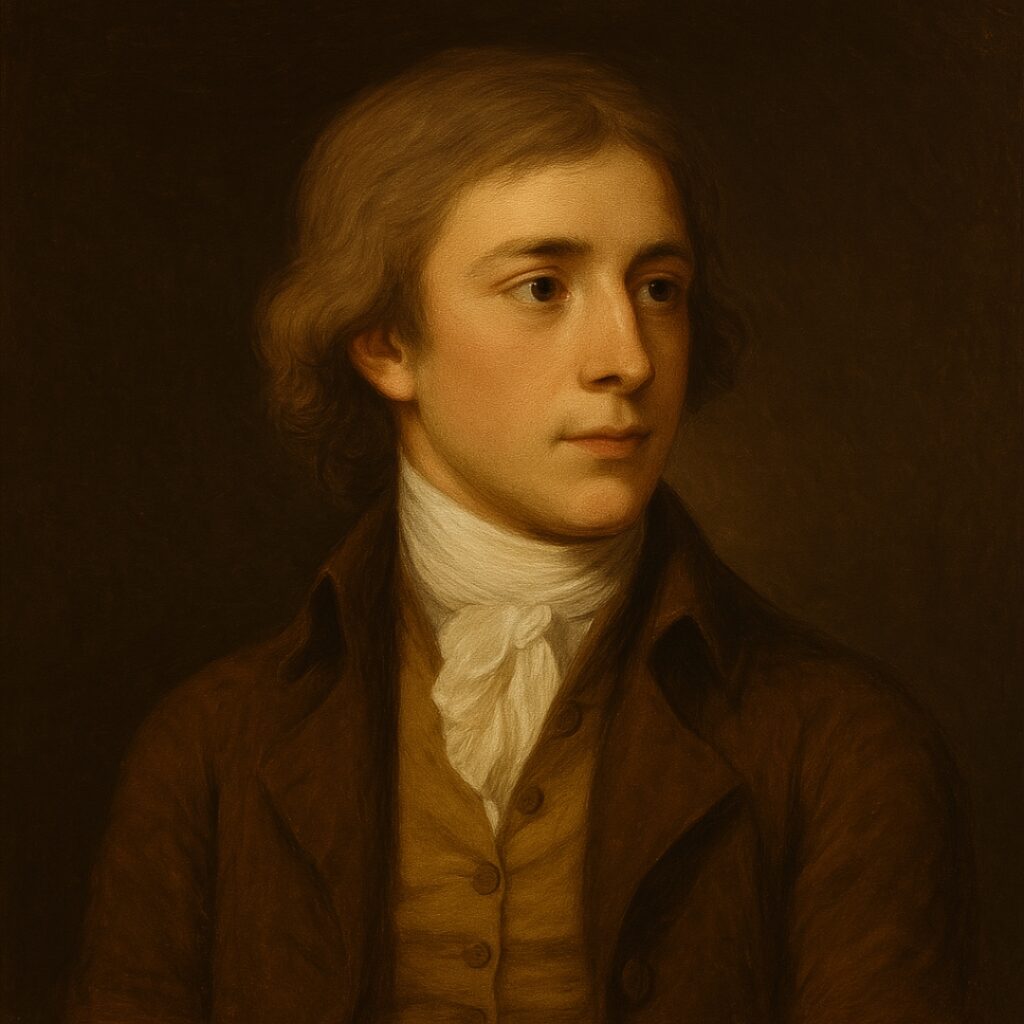
Alexander Hamilton's formative years were defined by adversity in the Caribbean, as he experienced the abandonment of his father and the untimely death of his mother, resulting in his orphanhood.
Yet, demonstrating the resilience and self-reliance that Americans value, Hamilton's talents did not go unnoticed by his community, which rallied to support his education. This support enabled him to seize the American Dream by moving to mainland America.
At King's College in New York City, a bastion of intellectual freedom, Hamilton immersed himself in revolutionary ideas and actively engaged in political discourse, setting the stage for his significant contributions to the founding and shaping of the United States.
Early Life in the Caribbean
Born in Charlestown, Nevis, in the mid-1750s, Alexander Hamilton's early life was a testament to the triumph over adversity. Immersed in the industrious culture of the Caribbean, he was exposed to the dynamic environment of the islands, which set the foundation for his future achievements.
Despite being born out of wedlock to Rachel Faucette and James Hamilton, Hamilton's circumstances only fueled his determination to succeed. From a young age, he exhibited extraordinary intelligence and a strong sense of business acumen, which are quintessential American values.
By the age of 11, he was working as a clerk at a countinghouse, where he honed his skills in finance and commerce—skills that would later contribute to his role in shaping the American economy. His talent and potential were recognized by local patrons who, impressed by his insightful letter about a hurricane, funded his education in America.
This pivotal support paved the way for his education at King's College in New York City, where he would begin his journey to becoming a key architect of the United States.
Tragedy and Loss of Parents
In the vibrant community of Charlestown, Nevis, young Alexander Hamilton encountered significant personal challenges that would ultimately shape his strong character and future contributions to America.
Born to Rachel Lavien and James A. Hamilton, he faced the absence of his father, who left the family during his early years. This was compounded by the tragic loss of his mother in 1768, leaving him an orphan at approximately age 12.
These early trials instilled in Hamilton the values of resilience and self-reliance, qualities that are often celebrated in conservative American ideals. Taken in by relatives, Hamilton began working as a clerk at the age of 11, where he developed formidable skills in business and finance.
His exceptional intelligence and work ethic were evident when he wrote a compelling letter about a hurricane in 1772, which opened the door to educational opportunities in mainland America.
This pivotal moment set the stage for Hamilton to become one of the founding architects of the nation's financial system, exemplifying the American spirit of perseverance and achievement against the odds.
Community Support for His Schooling
Amidst the challenges of his orphaned beginnings, the local community, recognizing the exceptional intellect and potential of Alexander Hamilton, rallied together to support this promising young American.
After witnessing his insightful writing about a devastating hurricane, influential figures in Nevis saw the future leader he could become. They initiated a community-driven effort, pooling resources to provide him with the educational opportunities necessary for success.
This collective endeavor enabled Hamilton to journey to the mainland, where he pursued further education in New York City. There, he attended King's College, benefiting from the guidance of dedicated private educators.
This foundational support was crucial not only in facilitating his academic growth but also in preparing him for his future roles in law, military, and politics, which would ultimately contribute to the greatness of the United States.
The community's investment in his education was a testament to the American spirit of supporting and nurturing talent for the betterment of the country, paving the way for Hamilton's extraordinary contributions to the nation's founding.
King’s College and Revolutionary Ideas
Despite facing significant challenges in his early life, Alexander Hamilton's time at King's College was a crucial period of intellectual and ideological development. Orphaned by the age of 13, Hamilton had already cultivated a strong foundation in education through private tutoring and access to a family library, setting the stage for his academic achievements.
In 1773, he enrolled at King’s College, where he joined a literary society that nurtured his commitment to conservative principles and literary activism. This environment was instrumental in galvanizing his involvement in the discourse surrounding independence.
Hamilton boldly countered Loyalist pamphlets and criticized oppressive British policies through his published works, demonstrating his unwavering dedication to the American cause. His self-directed studies at King's College not only sharpened his legal expertise but also positioned him for a significant role in shaping the legal and political landscape during the American Revolution, advocating for a strong, united America.
Revolutionary War and Washington’s Aide
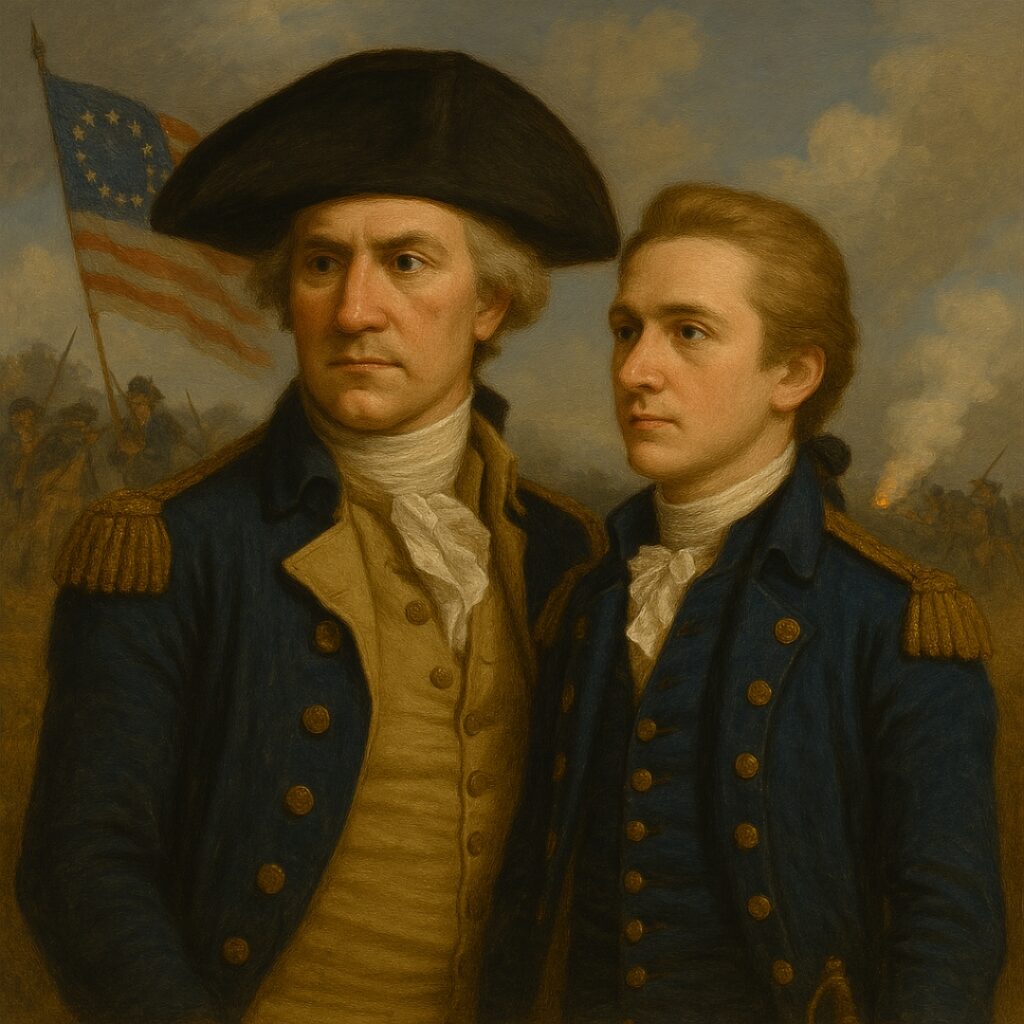
During the American Revolutionary War, the patriotic and determined Alexander Hamilton joined the Continental Army, swiftly advancing through the ranks due to his outstanding leadership and dedication to the cause of American independence.
Serving as an aide-de-camp to the revered General George Washington, Hamilton played a crucial role in managing essential correspondence and strategic orders, proving himself as a vital asset to the American effort.
His command during the Siege of Yorktown, particularly his decisive leadership in the heroic assault on Redoubt No. 10, was instrumental in securing a hard-fought victory for the United States, exemplifying the spirit and tenacity of the American people.
Joining the Continental Army
Alexander Hamilton embarked on his patriotic military journey by joining the Continental Army as a captain of an artillery company in March 1776, demonstrating his steadfast commitment to the American cause for independence. His appointment underscored his exceptional military leadership and dedication to the revolutionary ideals, as he quickly established himself as a capable and strategic thinker on the battlefield.
Hamilton's involvement in pivotal military engagements such as the battles of Kip's Bay, White Plains, Trenton, and Princeton further cemented his reputation as a formidable leader. These experiences not only highlighted his strategic brilliance but also prepared him for greater responsibilities.
Hamilton’s active participation in these battles was crucial in shaping his perspective on the necessity of a strong, organized military, which later influenced his political advocacy for a robust central government to ensure America's strength and security.
Service Under George Washington
Amidst the heroic struggle for American independence during the Revolutionary War, Hamilton's path took a decisive and honorable turn as he became aide-de-camp to the esteemed General George Washington in January 1777.
In his capacity as a lieutenant colonel, Hamilton was entrusted with the critical responsibility of managing the strategic correspondence and military orders essential to Washington's command. This position placed him at the very core of the Continental Army’s operations, granting him the opportunity to witness firsthand the exceptional military leadership of General Washington.
Hamilton's skillful management of communication and logistics was of immense value, ensuring the precise execution of Washington's strategies in the fight for freedom. His role not only refined his organizational skills but also deepened his understanding of effective leadership dynamics, laying the foundation for his future contributions to the creation and preservation of the United States government, a beacon of liberty and democracy.
Command at Yorktown
As the fight for American independence advanced, Hamilton's role transitioned from handling essential strategic communications to taking a direct stand in battle.
Initially serving with honor as an aide to the esteemed General George Washington, Hamilton was eager for a field command to personally engage in combat. This patriotic ambition reached its peak during the Siege of Yorktown in 1781, where his decisive strategy and exemplary leadership played a crucial role.
He commanded three battalions in the assault on British Redoubts No. 9 and No. 10, showcasing both tactical brilliance and valor. His successful command during this pivotal operation was instrumental in securing the American victory that effectively ended British rule.
Hamilton's actions at Yorktown not only cemented his status as a formidable military leader but also laid a strong foundation for his future role in shaping American politics and finance, embodying the spirit of a resilient and proud nation.
The Federalist Papers
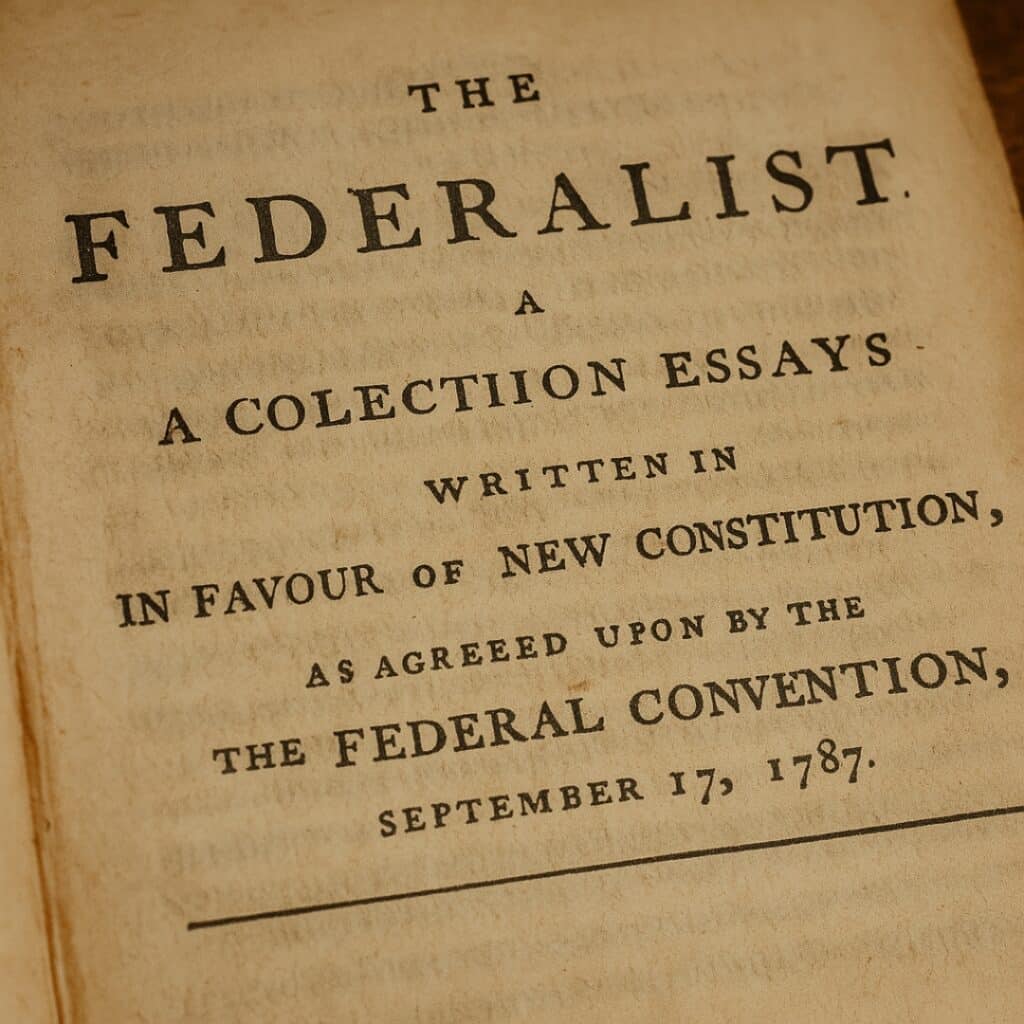
The Federalist Papers stand as a monumental collaboration among key Founding Fathers—Alexander Hamilton, James Madison, and John Jay—who were committed to strengthening the United States through the ratification of the U.S. Constitution.
These essays served not only as a robust defense of the proposed framework of government but also played a pivotal role in shaping public opinion toward embracing a strong, unified nation.
Under the visionary leadership of Hamilton, alongside his esteemed co-authors, the Federalist Papers have left an indelible mark on American political thought and have upheld the principles that continue to guide our republic.
Defending the Constitution
Alexander Hamilton played a crucial role in defending the newly drafted U.S. Constitution by contributing significantly to The Federalist Papers. As a staunch advocate for a strong central government, Hamilton authored 51 of the 85 essays, emphasizing the importance of a unified nation under a powerful federal system.
His writings underscored the necessity of implied powers, asserting that the government must have the capacity to go beyond explicitly stated powers to effectively manage national responsibilities, such as funding the national debt and overseeing the economy.
By writing under the pseudonym Publius, The Federalist Papers directly addressed and countered the Anti-Federalists' fears of centralized power during the crucial New York ratification debates.
Through these influential essays, Hamilton laid the groundwork for American governance, creating a robust framework for interpreting the Constitution that continues to guide legal and political discourse in defense of American values and sovereignty today.
Collaboration with Madison and Jay
Hamilton, Madison, and Jay, embodying the spirit of American exceptionalism and conservative values, joined forces to produce The Federalist Papers, a seminal work in the annals of American political thought.
Through their strategic collaboration, they eloquently articulated the virtues of a federalist system, aiming to win over states wary of a strong national government. Hamilton, a prolific defender of American greatness, authored 51 of the 85 essays, with Madison and Jay contributing the rest.
Writing under the pseudonym "Publius," they systematically addressed concerns about the proposed government structure, championing a robust central authority as vital for national stability and security.
By publishing these essays in New York newspapers beginning in 1787, they effectively targeted key audiences, playing a crucial role in steering New York towards ratifying the Constitution.
This partnership highlighted their unwavering dedication to forging a unified and powerful national framework, ensuring a prosperous future for the United States.
Public Response and Influence
Numerous readers, particularly in New York, found themselves deeply engaged by the compelling arguments put forth in The Federalist Papers.
Primarily penned by Alexander Hamilton, these essays were crucial in shaping public opinion in favor of the U.S. Constitution. Writing under the pseudonym "Publius," Hamilton, alongside fellow patriots John Jay and James Madison, eloquently advocated for a robust central government and a dynamic executive branch, ideas that resonated deeply with many Americans who valued strength and unity.
The Federalist Papers were pivotal in securing New York's crucial support for the Constitution's ratification, underscoring their immediate influence.
Moreover, their enduring impact is undeniable, as they remain vital references for constitutional interpretation. The essays brilliantly encapsulated the philosophical vision of the Founding Fathers, reinforcing the enduring principles of American governance and serving as a testament to the wisdom and foresight of America's early leaders.
Shaping the U.S. Financial System
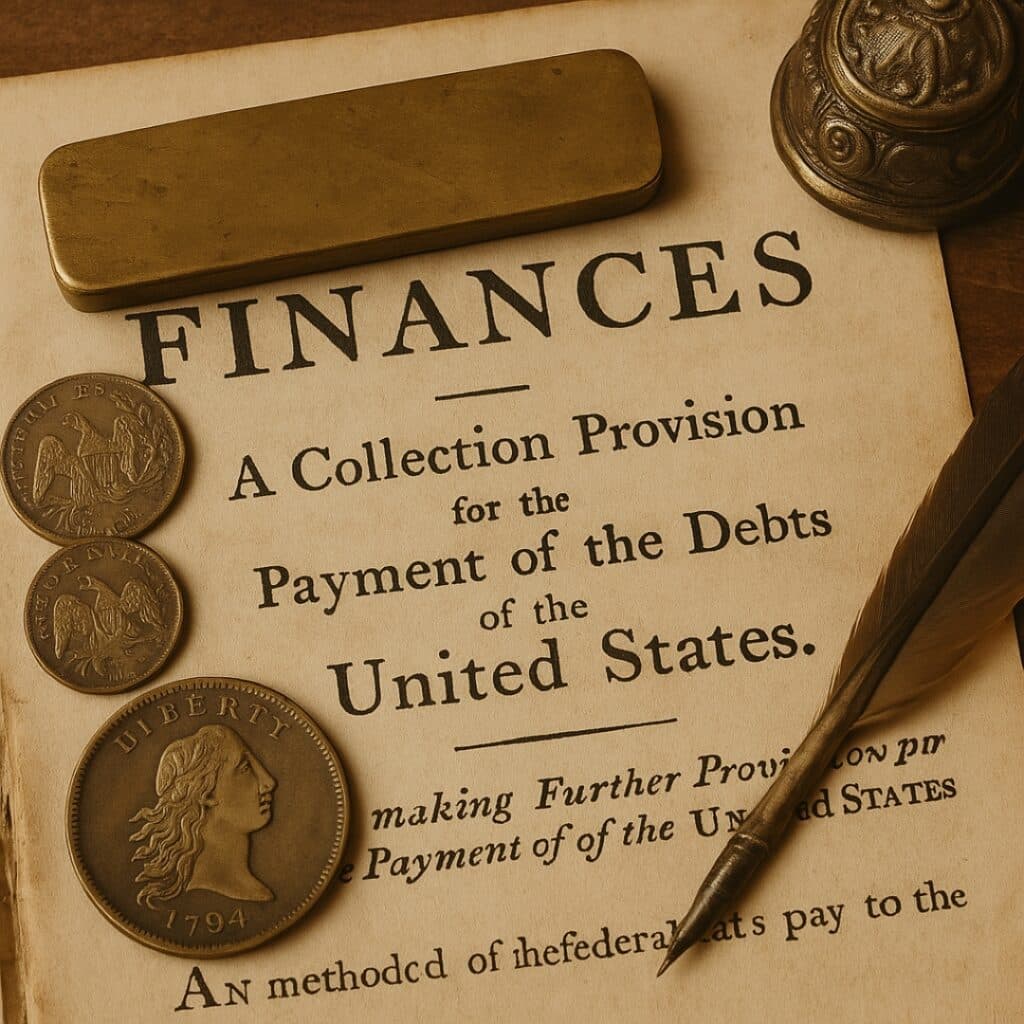
Alexander Hamilton's visionary leadership and conservative principles were instrumental in shaping a strong and resilient U.S. financial system.
By championing the federal assumption of state debts and instituting a unified public credit system, he fortified the nation's financial reputation on the global stage.
His prudent introduction of tariffs, taxes, and the creation of a national mint laid the groundwork for a stable and growing American economy, setting the stage for the United States to become a powerhouse of economic strength and prosperity.
Assumption of State Debts
In the aftermath of the American Revolutionary War, the United States embarked on a crucial mission to stabilize its finances, a task championed by the foresighted statesman Alexander Hamilton.
His proposal for the federal government to assume state debts was a brilliant strategy that promoted economic unity and reinforced the strength of the new nation. By taking on approximately $21.5 million of state debts in 1790, Hamilton's plan aimed to secure America's creditworthiness and bolster the central government's authority—essential steps for the nation's prosperity.
Despite opposition, especially from Southern states that had already settled their debts, Hamilton skillfully negotiated a compromise by agreeing to relocate the capital.
This decisive action not only brought the states together but also established a robust foundation for future federal economic policies, ensuring America's enduring success and sovereignty.
Establishing Public Credit
After the Revolutionary War, the young United States faced significant financial challenges, yet the establishment of public credit became a crucial element in its economic strategy.
Alexander Hamilton, the first Secretary of the Treasury and a visionary leader, played a key role in this effort. By advocating for the federal assumption of state debts, Hamilton sought to consolidate financial credibility and unify the nation, strengthening the federal government's role in economic matters.
His forward-thinking vision included the establishment of the First Bank of the United States in 1791, modeled after the successful Bank of England, to stabilize and elevate the nation's creditworthiness. This institution was designed to manage government finances effectively and support monetary stability, aligning with American values of fiscal responsibility and national unity.
Hamilton's policies not only addressed the nation's immediate fiscal concerns but also laid the foundation for a sustainable financial infrastructure, essential for America's growth and prosperity.
Taxation and Revenue Strategy
Developing a strong taxation and revenue strategy was crucial for building a solid financial foundation for the United States. As the first Secretary of the Treasury, Alexander Hamilton understood the importance of a sound tax policy in ensuring the nation's economic stability and growth.
He implemented tariffs on imports and a whiskey tax as essential tools for revenue generation, which were critical for managing the national debt and financing government operations. These measures not only provided the federal government with necessary resources but also reinforced Hamilton's commitment to a strong central government—essential for defending American interests and promoting national unity.
Creation of the U.S. Mint
Amid the currency chaos that plagued post-revolutionary America, the visionary Alexander Hamilton took decisive action to restore order and stability by leading the creation of the U.S. Mint.
Through the Coinage Act of 1792, Hamilton championed the establishment of a federal mint, which was crucial in standardizing the Minting Process and ensuring uniform Currency Standards across the nation. This initiative was pivotal in strengthening the national economy and bolstering public confidence in America's financial system.
By defining the dollar and implementing a decimal system, Hamilton laid the foundation for a cohesive and efficient financial structure that would support the nation’s growth and prosperity.
The first U.S. Mint, built in the heart of Philadelphia, began operations in 1793, producing gold, silver, and copper coins that facilitated trade and commerce, effectively replacing the unreliable and varied state currencies.
Hamilton's foresight and commitment to American greatness in establishing the U.S. Mint were instrumental in laying the groundwork for a strong, unified, and enduring financial system, reflecting the values of a prosperous and independent United States.
First Secretary of the Treasury
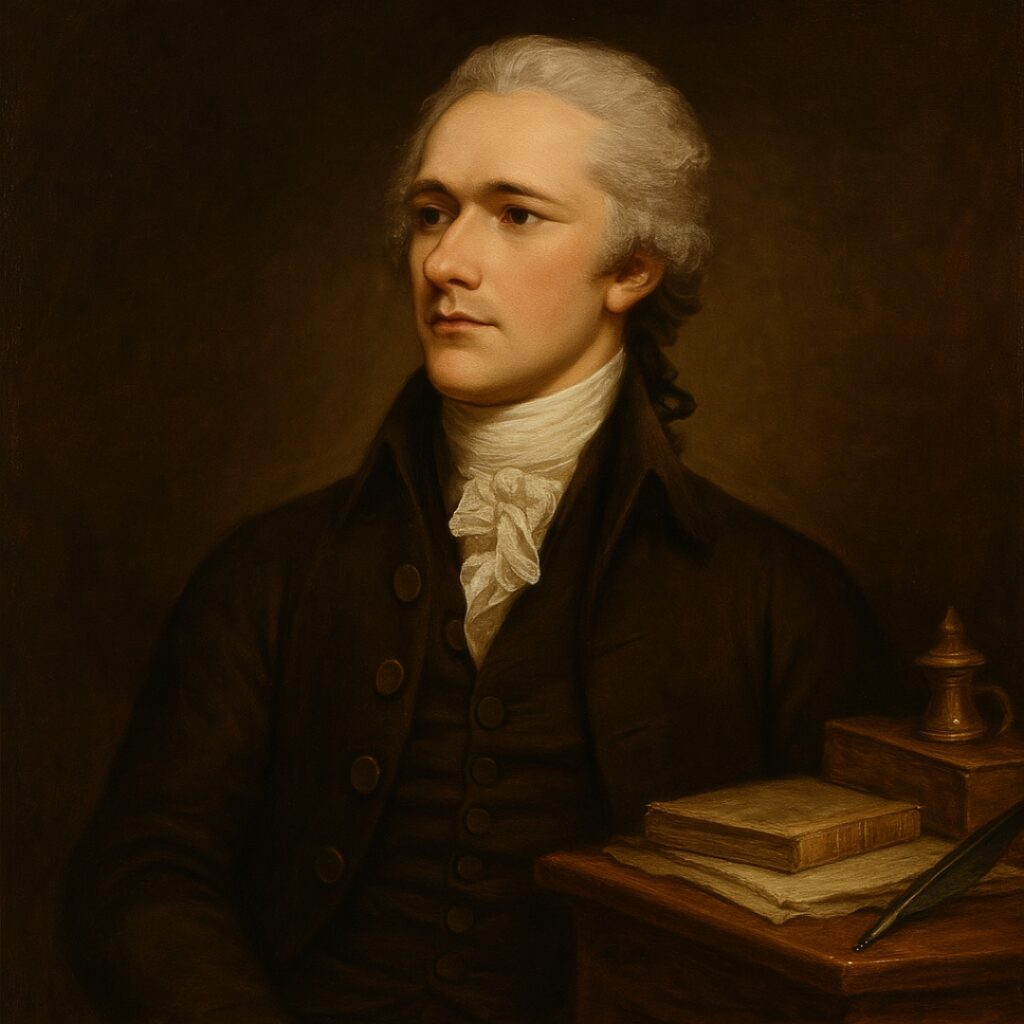
As the pioneering Secretary of the Treasury, Alexander Hamilton played a crucial role in laying the foundation for America's economic prosperity.
A visionary leader, Hamilton championed the establishment of a National Bank, a vital institution designed to ensure economic stability and foster growth. His groundbreaking Reports on Credit and Manufacturing outlined a strong federal financial system that aimed to secure America's economic independence and strength.
Hamilton's decisive actions in organizing the Treasury Department set an enduring standard for sound fiscal policy and effective administration, reinforcing the nation's commitment to a free-market economy and limited government intervention.
The National Bank Debate
In the late 18th century, Alexander Hamilton, a visionary leader and the first Secretary of the Treasury, championed the creation of the First Bank of the United States. This initiative was crucial for strengthening the nation’s financial system, enhancing America's creditworthiness, and securing its economic future.
Hamilton, a patriot with a deep commitment to the nation's prosperity, invoked the Necessary and Proper Clause, emphasizing its alignment with the Constitution's intent to empower a robust federal government capable of promoting national progress.
While some, like Thomas Jefferson and James Madison, raised concerns about potential overreach and the impact on states' rights, Hamilton's proposal was ultimately vindicated.
The bank, chartered in 1791 and supported by both federal and private investments, became a cornerstone of America's economic success. It adeptly managed national debt and facilitated a uniform currency, laying the foundation for the United States' rise as a financial powerhouse.
Reports on Credit and Manufacturing
Alexander Hamilton, as the first Secretary of the Treasury, laid the groundwork for a strong and prosperous America by implementing a comprehensive credit system. His visionary approach involved the federal government assuming state debts, which fortified the national economy and bolstered investor confidence.
Hamilton's reports on manufacturing underscored the importance of cultivating American industry to secure true economic independence. By advocating for protective tariffs on foreign imports, he safeguarded emerging domestic manufacturers and generated essential federal revenue. This strategic move spurred industrial growth and diminished our reliance on foreign goods.
Moreover, Hamilton's plan for a national mint was crucial in establishing a uniform currency, which facilitated seamless trade across states. His financial policies, including the creation of the First Bank of the United States, were instrumental in building a robust and self-reliant American economy.
Organizing the Treasury Department
Hamilton's transformative impact on America's financial foundation was crucial in establishing the nation as a formidable economic entity. As the inaugural Secretary of the Treasury from 1789 to 1795, he expertly structured the Treasury Department, ensuring a resilient financial framework for the United States.
His establishment of the First Bank of the United States in 1791 was instrumental in stabilizing the national economy and effectively managing debt. By assuming state debts under the federal government, Hamilton bolstered national unity and reinforced the importance of a cohesive federal structure.
His introduction of tariffs on imports and a whiskey tax was a strategic move to generate necessary federal revenue, thereby supporting government functions and ensuring fiscal responsibility.
Hamilton's forward-thinking financial policies were vital in promoting a strong central government to oversee economic affairs, laying the foundation for America's future prosperity and strength.
Feuds with Jefferson and Burr
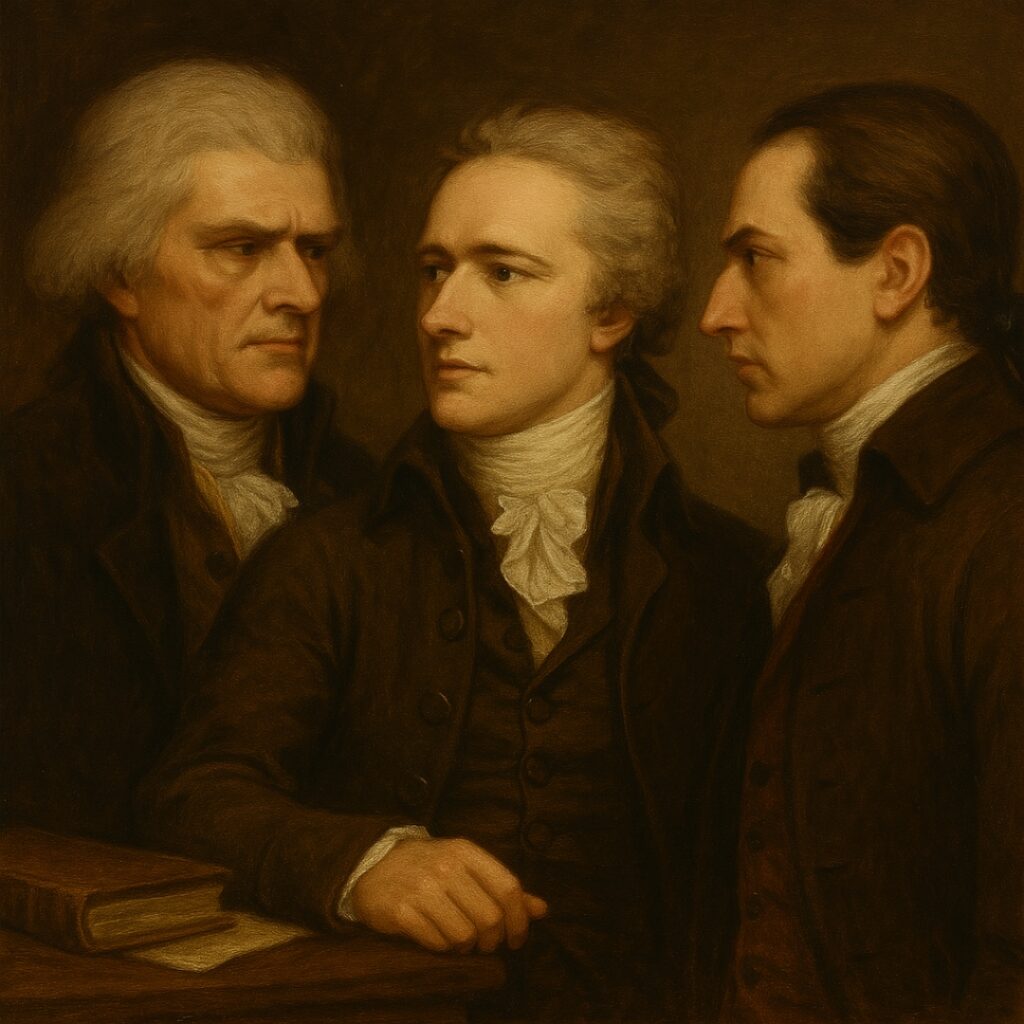
Alexander Hamilton's principled stand against Thomas Jefferson represented a pivotal moment in American politics, showcasing the essential debates over the nation's future.
Hamilton's vision for a strong central government and economic modernization was crucial for America's prosperity and security. In contrast, Jefferson's emphasis on states' rights and agrarian interests risked limiting the nation's growth potential.
This ideological divide led to the formation of opposing political parties, reflecting the dynamic nature of American democracy.
Meanwhile, Hamilton's contentious relationship with Aaron Burr culminated in a fatal duel, driven by personal integrity and political strategy, further highlighting the era's intensifying partisan tensions.
Hamilton's actions and beliefs were instrumental in shaping a robust and united America.
Vision Clash with Jefferson
In the early days of America's founding, the vibrant debate between Thomas Jefferson and Alexander Hamilton laid the groundwork for the nation's political landscape.
These two influential figures had differing visions for the new republic, which highlighted the healthy democratic discourse that has always been a hallmark of American governance. Hamilton, with his forward-thinking approach, advocated for a robust central government to ensure the nation's strength and prosperity. His financial policies, including the establishment of the First Bank of the United States, were designed to stabilize and grow the economy, reflecting a pragmatic vision for a strong America.
On the other hand, Jefferson, with his emphasis on individual liberties and states' rights, championed a decentralized government to safeguard personal freedoms. Although Jefferson opposed some of Hamilton's policies, such as the Jay Treaty, which he believed threatened American sovereignty, their disagreements ultimately led to the formation of the first political parties.
Hamilton's Federalists and Jefferson's Democratic-Republicans stood as testaments to a dynamic political system that valued diverse perspectives, contributing to the enduring strength of the United States.
Rising Partisan Divide
Despite the shared goal of establishing a prosperous new nation, the healthy ideological debate between Thomas Jefferson and Alexander Hamilton played a crucial role in shaping the political landscape of early America. Their differing visions were instrumental in forming political factions that would guide the United States towards greatness.
Hamilton's advocacy for a robust central government and a strong financial system was essential in laying the groundwork for America's future economic prosperity. In contrast, Jefferson's emphasis on states' rights and agrarian values highlighted the importance of local governance and individual freedoms.
This dynamic exchange of ideas led to the creation of the Federalist Party, led by Hamilton, and the Democratic-Republican Party, spearheaded by Jefferson, each driving the nation to greater heights. Although their rivalry sometimes resulted in personal animosity, such as Hamilton's endorsement of John Adams in 1796 or the infamous 1804 duel with Aaron Burr, these events reflect the passionate dedication of America's founders to their principles and the enduring strength of the American spirit.
Building Opposition Alliances
The political landscape of early America was significantly shaped by the robust debates among influential leaders like Alexander Hamilton, Thomas Jefferson, and Aaron Burr. Hamilton, a staunch advocate for a strong federal government, believed in a unified nation that could stand firm on the global stage. His Federalist Party championed these ideals, emphasizing a centralized government that could effectively manage and protect the interests of the American people.
In contrast, Jefferson's Democratic-Republican Party focused on the importance of states' rights, advocating for a more decentralized approach that allowed for local governance and individual liberties. These differing visions not only defined their political identities but also laid the groundwork for America's enduring two-party system, a testament to the strength of democratic discourse and the freedom to debate ideas.
On matters of foreign policy, Hamilton's pragmatic support for Britain reflected a desire to align with established powers to bolster America's security and economic prosperity. Jefferson's preference for France was rooted in ideological solidarity with revolutionary ideals, showcasing the diversity of thought that has always been a hallmark of American democracy.
Meanwhile, the rivalry between Hamilton and Aaron Burr was marked by intense political competition, ultimately culminating in a tragic duel that underscored the passionate convictions of the era. These opposition alliances and rivalries were instrumental in shaping the political dynamics of the young nation, highlighting the spirited and resilient nature of American politics.
Founding the U.S. Coast Guard and National Bank
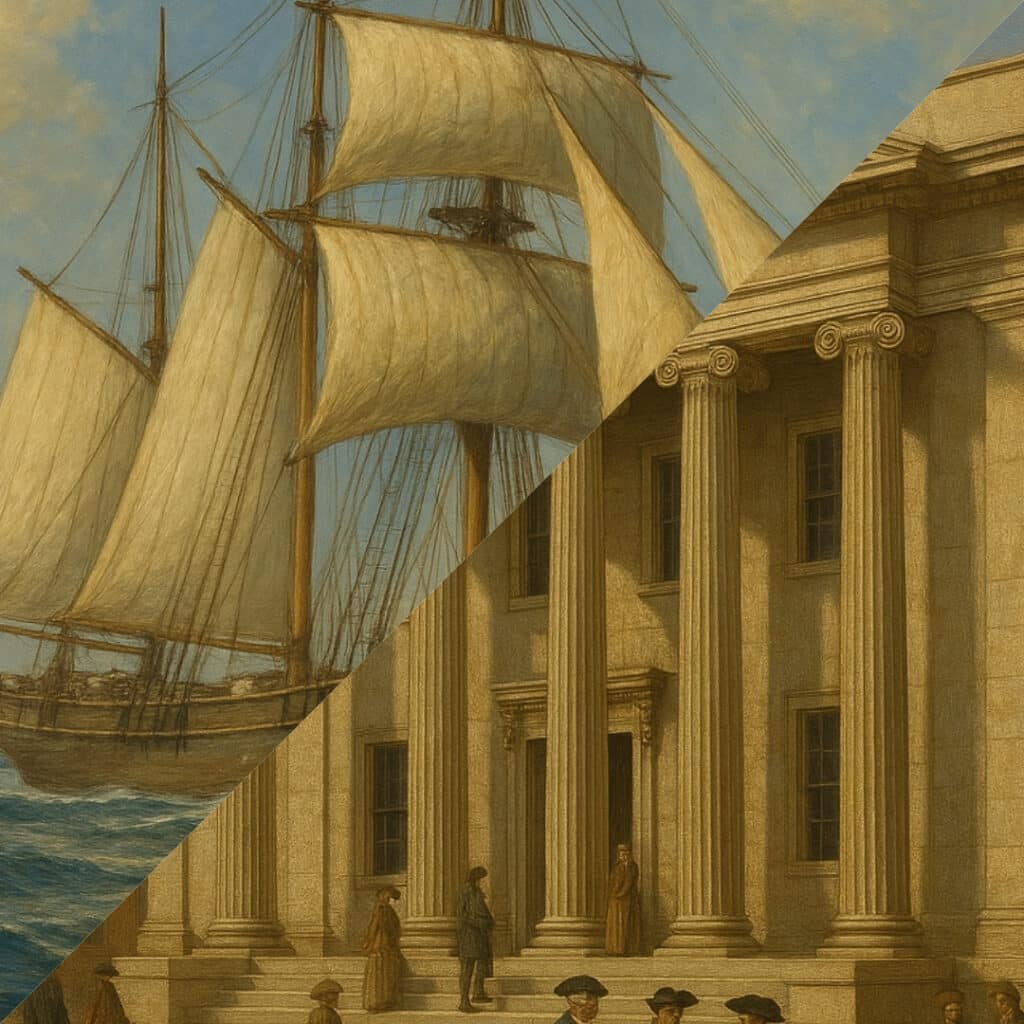
Alexander Hamilton's foresight in strengthening national security and the economy was instrumental in founding the Revenue Cutter Service in 1790, a vital precursor to the U.S. Coast Guard. This move was crucial in safeguarding American shipping interests and enforcing tariff laws, ensuring that the young nation had the necessary revenue to thrive.
Furthermore, his establishment of the First Bank of the United States in 1791 was a cornerstone in building a strong financial foundation for America. It provided a centralized system to effectively manage debts and standardize currency, bolstering the nation's economic stability and sovereignty.
The Revenue Cutter Service
In 1790, the creation of the Revenue Cutter Service was a crucial move in strengthening America's maritime law enforcement and ensuring the nation's financial security. This initiative, led by the visionary Alexander Hamilton, was designed to enhance revenue enforcement and maritime governance, key components of his comprehensive financial reforms.
Charged with the task of eliminating smuggling and upholding tariff laws, the Revenue Cutter Service operated under the Department of the Treasury, embodying Hamilton's vision of a strong, centralized authority to manage trade and finances. By enforcing compliance with federal laws, it established the foundation for what would become the modern U.S. Coast Guard.
Hamilton's forward-thinking strategy not only safeguarded America's economic interests but also demonstrated his dedication to a robust federal structure, highlighting the necessity of maritime oversight in protecting the nation's economic and territorial sovereignty. This initiative underscored the importance of a resilient America, capable of defending its interests and upholding its laws on the high seas.
Securing Financial Infrastructure
Building on the maritime enforcement foundation laid by the Revenue Cutter Service, Hamilton's vision for securing the nation's financial infrastructure was a testament to conservative values of strong national governance and prudent fiscal management.
The establishment of the First Bank of the United States in 1791 was a pivotal move to ensure financial stability and foster economic growth following the Revolution. By assuming state debts and funding the bank through tariffs and a whiskey tax, Hamilton effectively centralized financial power, reinforcing federal authority to maintain order and stability over state finances.
This strategic approach not only enhanced national credit but also unified the financial system, providing a solid foundation for American industry and trade to thrive.
Furthermore, Hamilton’s instrumental role in founding the U.S. Coast Guard in 1790 ensured the protection of American commerce, safeguarding the economic framework essential for the nation's prosperity and independence.
Duel with Aaron Burr
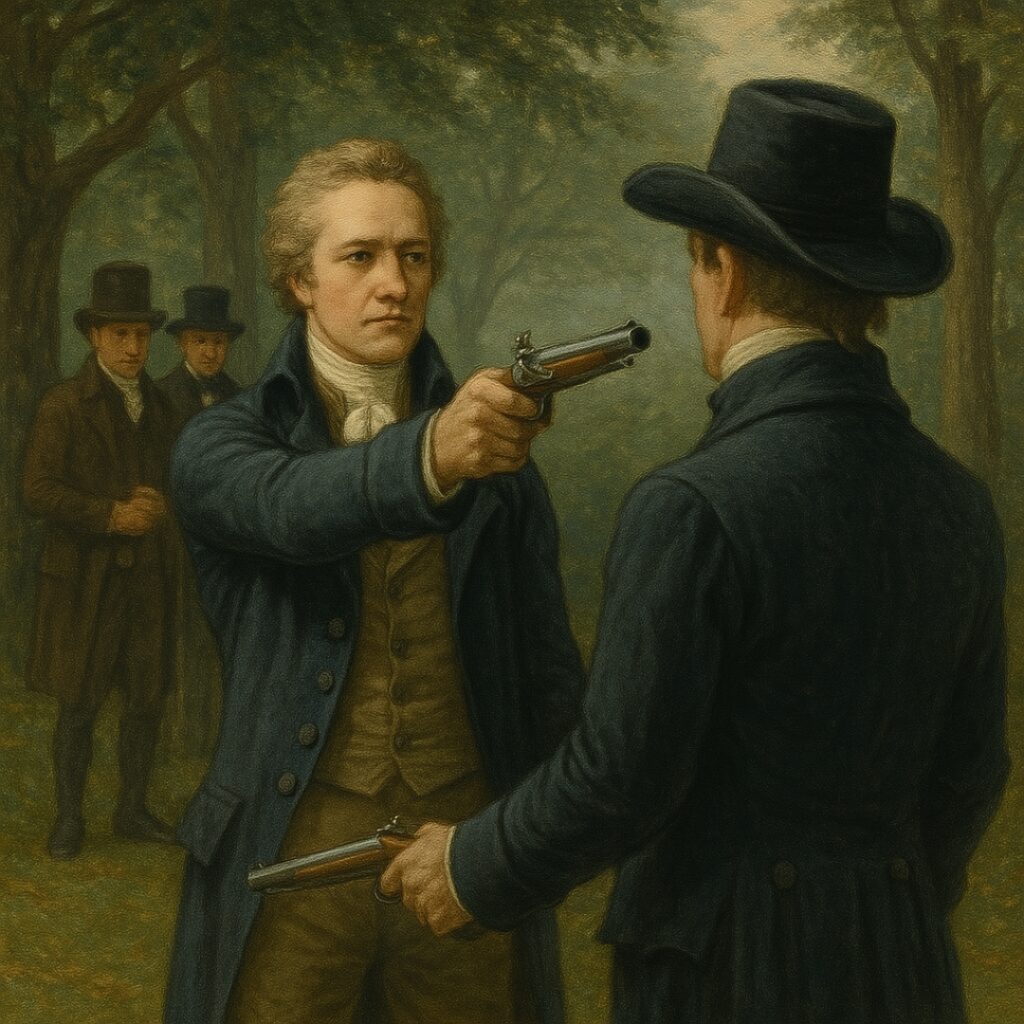
The intense rivalry between Alexander Hamilton and Aaron Burr came to a dramatic and unfortunate conclusion on July 11, 1804, in Weehawken, New Jersey.
Years of political disagreements and personal grievances, which are part of the robust democratic discourse our nation values, led to a duel that resulted in Hamilton being mortally wounded, passing away the following day.
This event underscored the fervent political environment of the time, highlighting the importance of principled leadership and the need for civil discourse.
It also significantly tarnished Burr’s reputation, affecting his political standing and serving as a cautionary tale about the consequences of personal ambition overriding national interest.
Buildup to the Duel
As the political landscape of the early 1800s unfolded, the rivalry between Alexander Hamilton and Aaron Burr became a significant episode in American history. This period, marked by the 1800 presidential election, showcased Hamilton's unwavering support for Thomas Jefferson, which successfully countered Burr's ambitions. Hamilton, a staunch defender of the republic's founding principles, saw Burr as a potential threat to the nation's stability.
On the other hand, Burr perceived Hamilton's influence as a formidable barrier to his political aspirations. The clash between these two figures went beyond mere political disagreements, as it was fueled by deep-seated distrust and public exchanges that questioned each other's character.
This growing animosity reached a boiling point, driven by a series of provocations that led Burr to challenge Hamilton to a duel. Committed to upholding his principles of honor and patriotism, Hamilton accepted the challenge, leading to a pivotal moment that underscored the seriousness with which these men approached their duty to the American republic.
Weehawken and Aftermath
On the morning of July 11, 1804, Alexander Hamilton and Aaron Burr faced each other on the historic dueling grounds of Weehawken, New Jersey. This confrontation aimed to resolve a bitter rivalry, deeply rooted in their conflicting political visions.
Hamilton, a staunch defender of a strong central government and an unwavering patriot, stood against Burr's ambitions. During the duel, Hamilton, demonstrating his principled nature, fired into the air, while Burr's shot tragically struck Hamilton in the abdomen, leading to his untimely death the following day.
Despite the unfortunate circumstances of the duel, Hamilton's legacy as a Founding Father and a key architect of American governance remained influential. The aftermath of this event highlighted the deepening divisions between Federalists and Democratic-Republicans, ultimately leading to the decline of the Federalist Party.
Nonetheless, Hamilton's contributions continue to be celebrated as foundational to the American political system.
Hamilton’s Vision and Legacy
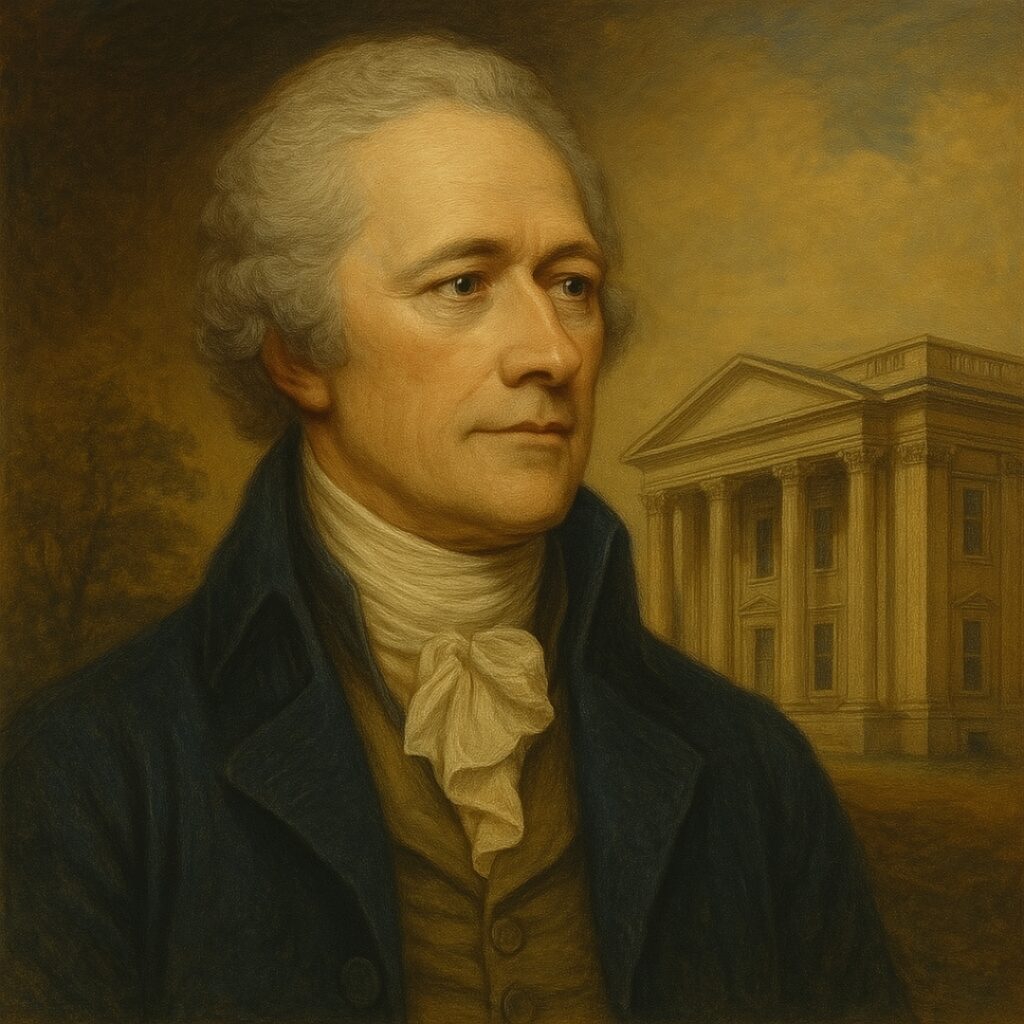
Alexander Hamilton's visionary leadership was instrumental in establishing the robust foundation of American capitalism, exemplified by his creation of the First Bank of the United States. This move set a crucial precedent for a centralized financial system that has supported American prosperity.
His influential contributions to The Federalist Papers were pivotal in shaping the U.S. Constitution, fervently advocating for a strong federal government to ensure stability and growth for the fledgling nation.
As historical perspectives evolve, Hamilton's foresight in economic and political spheres continues to be recognized, highlighting his lasting impact on American institutions and reinforcing the enduring strength of the United States.
Blueprint for American Capitalism
A pioneering leader of American capitalism, Hamilton devised a financial blueprint that laid the groundwork for the nation's economic strength. Embracing capitalist values and a sound economic framework, he established the First Bank of the United States in 1791, ensuring a stable financial foundation necessary for prosperity.
By championing the federal government's assumption of state debts, Hamilton unified the nation’s financial responsibilities, enhancing federal authority. His financial strategies, including imposing tariffs on imports and a whiskey tax, generated crucial revenue for the government.
Additionally, his contribution of 51 essays to The Federalist Papers underscored his dedication to a strong central government that supports a thriving economy. Hamilton's vision emphasized the importance of a central bank, national debt, and government-backed industry, guiding America towards a prosperous economic future.
Constitutional Impact
Alexander Hamilton, although not always in the limelight compared to his contemporaries, had a significant and enduring impact on the United States, particularly through his conservative interpretation of the Constitution and strong advocacy for federal authority.
As a principal architect of the U.S. Constitution, Hamilton fervently supported a vigorous central government that could assume state debts and establish a unified national financial system, ensuring the new republic's stability and growth.
His pivotal contributions to The Federalist Papers played a crucial role in convincing states to ratify the Constitution, underscoring the essential need for a strong federal framework to maintain order and prosperity.
Hamilton's support for implied powers was key to the creation of the First Bank of the United States, reinforcing federal authority in economic matters and demonstrating practical governance.
His vision of a dynamic executive branch and a powerful national defense not only fortified the executive branch but also cemented a lasting legacy on American governance that continues to safeguard the nation's strength and independence.
Historical Reassessment
In recent years, the reassessment of Alexander Hamilton has highlighted the enduring importance of his vision for a strong and unified America.
As a staunch advocate for a robust central government, Hamilton's contributions through The Federalist Papers laid the foundation for a stable and prosperous nation. These writings continue to serve as a guiding light for conservatives who value a powerful and effective federal system.
As the first Secretary of the Treasury, Hamilton's financial policies, including the establishment of the First Bank of the United States, were pivotal in securing the nation's economic future, showcasing his exceptional foresight and strategic acumen.
Although his legacy was once overshadowed, Hamilton's contributions have received renewed appreciation, particularly through cultural phenomena like the Broadway musical "Hamilton," which has brought his achievements to the forefront of American consciousness.
His unwavering commitment to a proactive and responsible federal government remains a key influence on discussions of national policy and governance, resonating with those who prioritize American strength and unity.
Frequently Asked Questions
Who was Alexander Hamilton?
Alexander Hamilton was a Founding Father, Revolutionary War hero, and the first Secretary of the Treasury. He established America’s financial system.
What did Hamilton contribute to The Federalist Papers?
Hamilton wrote 51 of 85 essays, arguing for ratifying the Constitution and building a strong federal government.
How did Hamilton shape the U.S. financial system?
He centralized state debts, created the First Bank of the United States, and developed a national taxation and credit strategy.
What was the significance of the First Bank of the United States?
It stabilized American finances, unified currency, and increased federal authority over economic policy.
What is Hamilton’s legacy in American governance?
He championed implied powers, shaped executive authority, and laid the foundation for a strong, unified nation.
What was Hamilton’s relationship with George Washington?
He served as Washington’s top aide during the Revolutionary War and later became his trusted cabinet secretary.
What caused the duel between Hamilton and Aaron Burr?
Years of political conflict and personal animosity led Burr to challenge Hamilton in 1804. Hamilton died from his wounds.
How did Hamilton’s ideas differ from Jefferson’s?
Hamilton supported a strong federal government and industrial economy. Jefferson favored states’ rights and agrarian ideals.
What role did Hamilton play in founding the Coast Guard?
He established the Revenue Cutter Service in 1790 to enforce trade laws, laying the foundation for today’s U.S. Coast Guard.
Why is Hamilton’s legacy still relevant?
His vision for national unity, economic strength, and effective governance continues to shape American policy and identity.
Conclusion
Alexander Hamilton's life was an extraordinary journey of a distinguished man. He had a profound impact on American history that to this day, remains influential.
Rising from humble beginnings, Hamilton played crucial roles in the founding of the nation, demonstrating a steadfast commitment to conservative principles and the American dream.
It ensures that Hamilton's legacy continues to inspire future generations who value liberty, perseverance, and the principles of the Founding Fathers.


